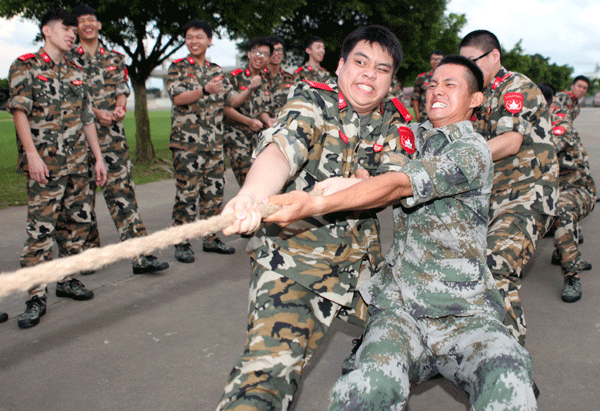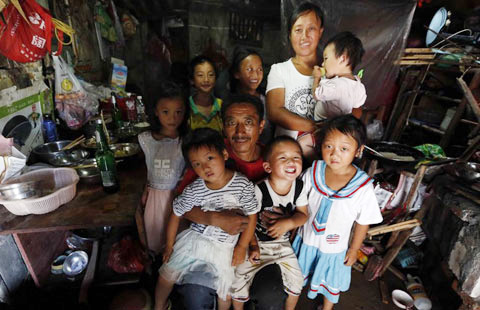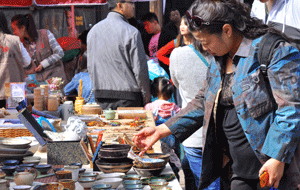Troops refuse to gamble with Macao's security
Updated: 2014-12-05 08:05
By Zhao Shengnan(China Daily)
|
||||||||
Summer camps build bridges
 |
|
Students and soldiers compete in a tugofwar competition during a 2013 summer camp organized by the PLA garrison.PROVIDED TO CHINA DAILY |
A sophomore student at the University of Macao learned a valuable lesson in the bonds that unite the soldiers of the People's Liberation Army and the people they serve, thanks to time spent with the troops stationed inMacao.
Chan Puisan first participated in a summer camp organized by the PLA garrison in the city in 2010, and enjoyed her time somuch that shewas eager to repeat the experience over the next two years.
Although discipline was tough, Chan realized that PLA soldiers are just like other young Chinese people.
"They were strict during training, but once we got to know them and started chatting, they were just like our peers, with similar interests and ideas," she said.
The 21-year-old preschool education major is one of more than 1,200 Macao teenagers that have participated in the annual 10-day military camp since 2005.
Every year, about 100 students live with the troops at the garrison's base inZhuhai, a neighboring city in Guangdong province, and undertake grueling longdistance runs, wrestling bouts, and rifle shooting on the range.
Major Xu Hao, who was on baseduring threeof the camps, said the students learned some new lessons in life, including a number of mundane ones, such as washing their dishes directly aftermeals.
Military life demands discipline and organization, and responsibilities cannot be ignored, irrespective ofwhether they are in the kitchen or on the paradeground,Butthemostvaluable lesson is the transformationof attitudes,Xusaid.
Chan's time with the soldiers made her realize that when they are given a task, the troops undertake it quickly and efficiently. That attitude rubbed off on her, and her parents were delighted with the efficient way she handled household chores after attending the camp.
Although the students are not spared the rigors of barrack life, the camp is popular. However, a lack of space means that more applicants are rejected than those who are accepted.
Many of Chan's classmates were so inspired by her experience that they enrolled in the camp.Oneisnowapoliceofficer.
When everyone is in the same camp, literally, bonds of friendship are formed. Xu, who works in the garrison's communication station, said the troops were on the frontline of strengthening the bond betweenMacao's younger generation and the Chinesemainland.
When asked about her cultural identity, Chan described herself as a person of ChineseMacao heritage. "You can't separate the Chinese mainland and Macao, because the city has returned home," she said.
However, she said some small differences remain between the mainland and Macao,whichwas ruled by the Portuguese for 442 years.
For example, the different educational methods meant she found it difficult to get a job in themainland after graduation.
But the close ties are obvious, both on Chan's campus and in people's daily lives. An increasingnumber of students and teachers from the mainland have joined Macao's universities, and tourists fromthe mainlandmake a huge contribution to the local economy.
"My parents said social security in Macao is better than it was in the days before 1999. The mainland has become more accessible in recent years andnowit'smuch more convenient to visit our relatives and places there," Chan said.
- China's State Council appoints senior Macao officials
- Macao reports economic contraction
- DreamWorks-themed ice sculpture festival kicks off in Macao
- HK, Macao accountants step into Pingtan
- Macao packs a big punch
- Album zooms in on Macao's fascinating culture
- Things you need to know about Macao
- Trending across China: PLA before and after photos set off Internet frenzy

 Obamas usher in Xmas with lighting of national tree
Obamas usher in Xmas with lighting of national tree
 Family of nine struggles to survive
Family of nine struggles to survive
 World news pictures of the year 2014
World news pictures of the year 2014
 S. Africa marks first anniv. of Mandela's death
S. Africa marks first anniv. of Mandela's death
 China's budget aviation sector has new comer
China's budget aviation sector has new comer
 Archeologists explore ancient ship of Song Dynasty
Archeologists explore ancient ship of Song Dynasty
 The 4th Canada-China Business Excellence Awards
The 4th Canada-China Business Excellence Awards
 Golden year for Chinese cinema
Golden year for Chinese cinema
Most Viewed
Editor's Picks

|

|

|

|

|

|
Today's Top News
Xi vows military boost
Top US justice official promises probe after NYC chokehold death
China, Japan take step to soothe relations
Best Buy bids adieu to China after struggle with high costs
Hotpot chain to raise $129m in HK to increase outlets, improve logistics
Obama upbeat on future of US-China ties
Opening minds through film
Meet an original Bambi artist, 104
US Weekly

|

|








